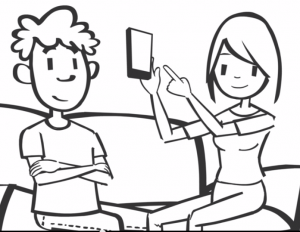NOTE: As of Oct 7th, this app has been pulled by iTunes. See comments below.
We’ve seen apps helping people hook up, apps for people who just want to “cuddle”… I guess it’s no surprise that now some college students will rely on an app for sexual consent.
In a world where laws are emerging requiring mutual “affirmative consent” in attempt to prevent or reduce sexual abuse, miscommunication or regretted sexual activities, I guess I should have guessed this app would surface.
The app is called Good to Go, and it is already drawing criticism. The app targets college-age adults in an attempt to create a pause before sexual activity so that both parties can agree to what is about to take place. Here’s the YouTube ad for the app:
When one of my readers, Tom, forwarded me information about this app, I found myself shaking my head for multiple reasons. But as a researcher of youth culture, I found the app fascinating, yet another exhibit of evidence that today’s young people are growing increasingly dependent on technology for communication… even about the important stuff.
It’s one of my growing concerns about this generation. Screen time replacing face-to-face time. The inability to understand social cues during interpersonal communication. A decline in intimate friendships.
This isn’t the first time we’ve seen young people choosing screens for important communication. In my book Connect: Real Relationships in a World of Isolation, I highlighted an intriguing study where doctors compared face-to-face dialogue to communication through screens. In this study, researchers observed the effectiveness of doctors using computers to collect data from teenagers because “young people will type more on a screen than they will share face-to-face.” Doctors surveyed teenagers about subjects such as self-injury or feelings of depression. In face-to-face interviews, 52 percent of the students responded. That number went up to 69 percent when students could use a computer to respond.
“A teenager who is sad and maybe even considering suicide may be reluctant to tell a doctor about life-threatening troubles. But the same teenager is far more likely to tell a computer a secret that he or she would be hesitant to share with even a close friend, much less a clinician who may be a friend of the family.” (ABC News)
If teens are much more comfortable with screens, then maybe an app catalyzing important conversations isn’t such a huge leap.
What’s next? The will you marry me app? (Or, sadly, and more likely, the will you cohabitate with me app?)
What is your reaction?
JONATHAN MCKEE IS THE AUTHOR OF OVER A DOZEN BOOKS INCLUDING THE UPCOMING RELEASE, MORE THAN JUST THE TALK
Posted in Jonathan's Rant, News, Sexuality, Smartphones/Cell Phones, Social Media, Youth Culture | | Leave A Comment



 Follow
Follow
This is such a horrifyingly dumb idea. To think that this app would be used, when people could just have a conversation, so that you could remain confidential about yourself, is just ridiculous!
I seriously can’t get over the fact that this is a thing… please tell me it’s not real.
I guess foreplay looked different for my generation.
Hahaha… I literally almost fell out of my chair when I read that. Thanks Rick. Very true.
Well I guess it would help with the whole, She said yes last night but now in the morning she said no problem. I also guess it would help with taking a pause from hormones long enough to honestly evaluate if you want to go forward or not. BUT I don’t exactly remember the stat of condom use- but if my hormones make me forget about a condom, whats going to make me remember about a phone app? Unless there was a secret -by saying yes it sends a text to my parents who come and stop me- thing. But that would be creepy on a whole other level.
Very romantic….lets see how disconnected we can get from each other as we become one…this world 0-0
I’d read an article a couple years ago talking about how big a problem rape is at U.S. universities. Maybe they felt if girls had this on their phone and it wasn’t used, it’d be one more indicator that they’re telling the truth when they claim they were raped (pretty weak argument, could even be used for the opposite purpose…to frame someone by deliberately not using it when you are giving consent and the guy doesn’t happen to know about such an app).
When hormones are flaring, some people abandon sense and responsibility, so showing the app wasn’t used just isn’t much proof of rape.
On another note, how many times could it start with consent only to find out the other party’s into objectionable activity and won’t listen to pleas to stop? This app also won’t help in that scenario.
Also wouldn’t help when someone is coerced to complete it. There’s a sobriety test in that screenshot, too, which the coercing party could complete and the inebriated party would never remember.
IMHO, doesn’t accomplish much. Maybe it would offer a tiny modicum of protection to someone who did in act in mutual consent and was later wrongfully accused of rape, but who knows how much weight this would hold in court. It’d probably be more effectively used afterward during cuddle time (like giving someone a prenup after asking them to marry you).
UPDATE: iTunes Store has pulled the App and the creator has pulled it from Google store as well. Article on the link —>> https://www.yahoo.com/tech/apple-shuts-down-good2go-the-controversial-sexual-99406257444.html